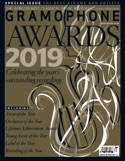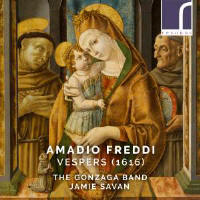Texte paru dans: / Appeared in: |
|
|
Outil de traduction (Très approximatif) |
|
|
Reviewer: David Vickers The Gonzaga Band explore remoter byways of early 17th-century north Italian music with this assortment of sacred pieces by Amadio Freddi (c1580-1643), a talented practitioner of the modern concertato style who trained at the basilica of San Antonio in his native Padua, worked as maestro di cappella at cathedrals in Treviso (1615-26) and Vicenza (1626-32), and then returned to Padua to become maestro at San Antonio for the rest of his life. Whatever the origins of the five Vesper psalms and a Magnificat taken from Messa, vespro et compieta (printed in Venice, 1616), director Jamie Savan’s praise that they have ‘striking originality and sophistication’ is borne out by beguiling music-making. Freddi partners five voices imaginatively and resourcefully with a small instrumental trio of violin (Oliver Weber bowing with rapier-like eloquence), a single cornett (Savan’s fluid playing often sounding like an extra singer) and organ (Steven Devine using digital samples of a historic Slovene organ built in the Venetian tradition). There are graceful weightlessness, devotional intimacy, overlapping contrapuntal details that pull the ear, and ingenious hints at larger-scale polychoral splendour. The use of high pitch (A=466Hz) and mean-tone temperament are fundamental contributions to the lucid brilliance of textures. Freddi’s hymn Ave maris stella is reconstructed from incomplete part-books of Hinni novi concertate (Venice, 1642). Two solo motets are taken from the anthology Ghirlanda sacra compiled by Leonardo Simonetti (Venice, 1625); Thomas Herford’s mellifluous singing of Cognoscam te, Domine and Faye Newton’s articulate Salve regina are both accompanied deftly by Devine, who also plays four short organ intonazioni by both Gabrielis (1593). There are assorted ‘extra-liturgical adornments’ by several more composers closely associated with St Mark’s: Donati’s response Domine ad adiuvandum (1623) is enunciated sweetly, Grandi’s solo soprano motet Tota pulchra es (1621) is sung rapturously by Newton, and the instrumental trio play two sinfonias from Marini’s Affetti musicali (1617) and a dazzling sonata from Castello’s first book (1621). The Gonzaga Band’s classy musicianship and intrepid curiosity reaffirm that there are riches to be found among Monteverdi’s overlooked contemporaries. |
|




